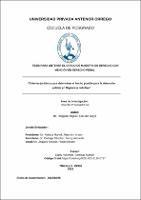| dc.contributor.advisor | López Valverde, Santiago Manuel | |
| dc.contributor.author | Delgado Miguel, Claudia Mayli | |
| dc.creator | Delgado Miguel, Claudia Mayli | |
| dc.date.accessioned | 2022-11-28T19:38:25Z | |
| dc.date.available | 2022-11-28T19:38:25Z | |
| dc.date.issued | 2022 | |
| dc.identifier.uri | https://hdl.handle.net/20.500.12759/9754 | |
| dc.description.abstract | La flagrancia delictiva constituye una condición determinante para ejecutar la
medida de coerción personal llamada “detención”, la misma que según el
ordenamiento jurídico procesal se encuentra conferida únicamente a la policía
nacional del Perú, de conformidad con lo establecido por el literal f) del numeral
24 del artículo 2° de la Constitución, que prescribe “Nadie puede ser detenido
sino por mandamiento escrito y motivado del juez o por las autoridades
policiales en caso de flagrante delito”.
Sin embargo, la falta de criterios claros para la determinación del hecho punible
para proceder a la detención en flagrancia delictiva, ha generado una
diversidad de actuaciones por parte de la Policía Nacional que se sujetan al
carácter subjetivo e interpretación personal de los hechos por parte quienes
proceden a la detención.
Actualmente, la “flagrancia delictiva” prevista en el art. 259° del Código
Procesal Penal viene siendo tratada por la doctrina y la jurisprudencia desde el
punto de vista temporal y subjetivo; es decir, en relación al momento en que se
produce el hecho punible, además de los elementos que vinculan al autor o
participantes de la conducta delictiva. Sin embargo, ha sido escaso el estudio,
de cómo debe entenderse al hecho punible, o cuales serían los criterios
jurídicos, a fin de que proceda la ejecución de la medida de detención. | es_PE |
| dc.description.abstract | Criminal flagrancy constitutes a determining condition to execute the measure
of personal coercion called ““detention““, the same that according to the
procedural legal system is conferred only to the national police of Peru, in
accordance with the provisions of literal f) of numeral 24 of article 2 of the
Constitution, which prescribes ““No one can be detained except by written and
reasoned order of the judge or by the police authorities in case of flagrante
delicto““.
However, the lack of clear criteria for determining the punishable act to proceed
with the arrest in flagrante delicto, has generated a variety of actions by the
National Police that are subject to the subjective nature and personal
interpretation of the facts by those who proceed to arrest.
Currently, the ““criminal flagrance““ provided for in art. 259° of the Criminal
Procedure Code has been treated by the doctrine and jurisprudence from the
temporary and subjective point of view; that is, in relation to the moment in
which the punishable act occurs, in addition to the elements that link the author
or participants in the criminal conduct. However, there has been little study of
how the punishable act should be understood, or what the legal criteria would
be, in order for the execution of the detention measure to proceed | en_US |
| dc.description.uri | Tesis | es_PE |
| dc.format | application/pdf | es_PE |
| dc.language.iso | spa | es_PE |
| dc.publisher | Universidad Privada Antenor Orrego - UPAO | es_PE |
| dc.relation.ispartofseries | M_DERE_196 | |
| dc.rights | info:eu-repo/semantics/closedAccess | es_PE |
| dc.rights.uri | https://creativecommons.org/licenses/by/4.0/ | es_PE |
| dc.source | Universidad Privada Antenor Orrego | es_PE |
| dc.source | Repositorio institucional - UPAO | es_PE |
| dc.subject | Hecho Punible | es_PE |
| dc.subject | Flagrancia Delictiva | es_PE |
| dc.title | Criterios jurídicos para determinar el hecho punible para la detención policial en flagrancia delictiva | es_PE |
| dc.type | info:eu-repo/semantics/masterThesis | es_PE |
| thesis.degree.grantor | Universidad Privada Antenor Orrego. Escuela de Postgrado | es_PE |
| thesis.degree.name | Maestro en Derecho Penal | es_PE |
| thesis.degree.discipline | Maestría en Derecho | es_PE |
| dc.subject.ocde | http://purl.org/pe-repo/ocde/ford#5.05.02 | es_PE |
| renati.advisor.orcid | https://orcid.org/0000-0003-1125-0737 | es_PE |
| renati.author.dni | 70493424 | |
| renati.advisor.dni | 41807331 | |
| renati.type | http://purl.org/pe-repo/renati/type#tesis | es_PE |
| renati.level | http://purl.org/pe-repo/renati/level#maestro | es_PE |
| renati.discipline | 421357 | es_PE |
| renati.juror | Rebaza Martell, Alejandro Arturo | |
| renati.juror | Carbajal Sánchez, Henry Armando | |
| renati.juror | Zegarra Arévalo, Ronal Manolo | |
| dc.publisher.country | PE | es_PE |


